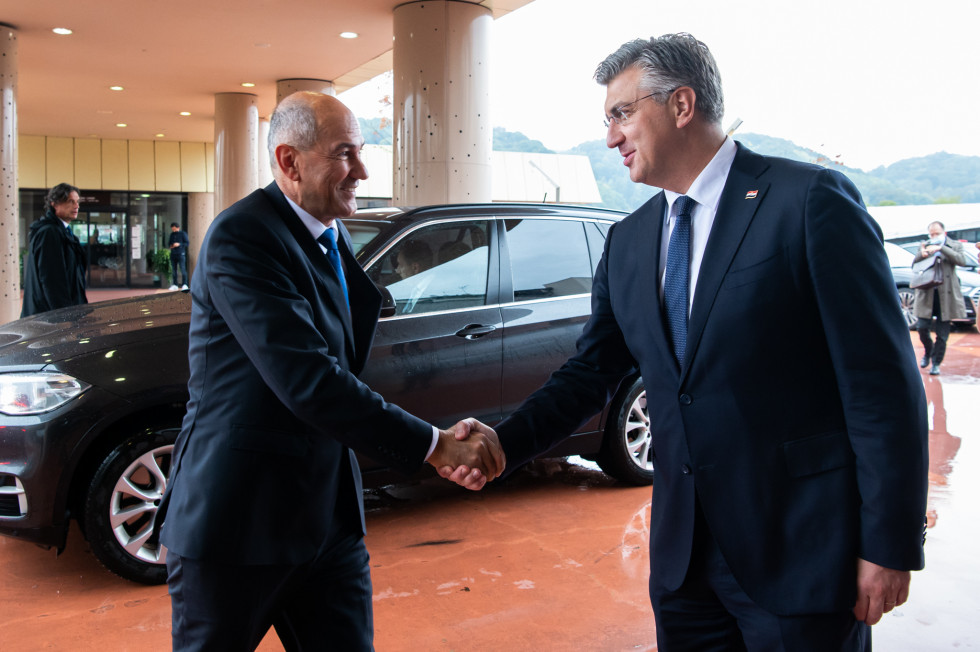Prime Minister Janez Janša attended the Tourism 365, a Croatian conference on tourism, in Terme Tuhelj, where he took part in a panel discussion together with Croatian Prime Minister Andrej Plenković. The conference focused on initiatives and plans for post COVID tourism, smart and sustainable business operations, new technologies and a new future for tourism.
During the talks with his Croatian counterpart, Prime Minister Janša spoke about cooperation between the two countries, the need for a continued dialogue and resolving outstanding issues. He highlighted that since Croatia has joined Slovenia as a member of the EU, NATO and other international organisations, a number of issues have been raised that require further discussion. “When it comes to balancing interests within the EU, Slovenia and Croatia share similar views in many matters. However, on certain matters, our views differ,” said the Prime Minister. He pointed out that since Croatia has become an EU Member State, the cooperation between the two countries in many areas has not just been good, but excellent. “Around a third of Slovenian investments outside the Republic of Slovenia are in Croatia. We are talking about over EUR 2 billion’s worth of investments. There are, however, also about a billion’s worth of Croatian investments in Slovenia.” The Prime Minister added that Croatia joining the euro area will not only be welcomed in Croatia, but also in Slovenia. “It’s not just about administrative steps, it’s about people’s experience. The use of the same currency is also a further incentive for economic cooperation,” believes the Prime Minister. During the talks, he also stressed the importance of the enlargement of the Schengen Area. The Prime Minister said that at the informal EU summit, a great deal has been said about the security challenges of the European Union, and that strong support was shown for the non-Schengen EU Members States to join the Schengen Area, since all of them had already fulfilled the technical conditions. “This is in our common interest. It happens both in world and European politics that a matter in the common interest is made conditional. However, it is important to consider the advantages and disadvantages, and it is clear what the advantages are in this case,” the Prime Minister added.
Further talks focused on the COVID‑19 epidemic. “At the start of the epidemic, the situation in Croatia was slightly different than in Slovenia, as Slovenia also saw a change of government. The new government was left with empty warehouses and no plans or preparations for the situation,” said the Prime Minister, adding that, given the situation at the time, Slovenia had no choice but to place restrictions on movement during the first wave of the epidemic. “Slovenia restricted movement to municipalities because of the civil protection services that are set up there, which are very organised and were able to help the country through the situation,” he emphasised. The Prime Minister went on to say that the coronavirus epidemic is a situation where the less protective equipment you have, the more restrictive measures you have to take. “Fewer vaccinated people mean a greater risk of spreading the virus, which in turn means more measures that restrict public life.”
With regard to the tourist season, Prime Minister Janša said Croatia had organised itself well, adding that the swift agreement reached at the EU level on the COVID-19 certificate had also contributed to the successful action. He went on to stress the importance of introducing tourism vouchers in Slovenia in 2020 and 2021, explaining that this year’s vouchers can also be used for cultural, recreational and other activities, and that EUR 200 million had been allocated for them this year. “If it were not for these vouchers, we would have had to pay for absences from work of between 60,000 and 65,000 people. We agreed that an incentive in the form of vouchers was a better choice.” He said that with the help of the vouchers, the tourism industry had not stalled, people kept their jobs, and the subsidies did not have to be used to cover fixed costs. “It was a win-win situation.”
“The future cooperation between Slovenia and Croatia can be better than it was in the past. In terms of economic cooperation, the past cooperation was good. With both countries now part of the EU and due to the abolition of customs duties and administrative barriers, new and better conditions for joint projects have been created, which we may not have even fully realised yet. When a new opportunity arises, you usually cannot seize it overnight. It takes time to put in place the necessary administrative and other conditions. But some things will give an extra boost to economic and tourism cooperation,” the Prime Minister said. He also stressed the importance of joint cooperation between the ports of Rijeka, Trieste and Koper. “The right conditions for major projects are also being set. Conditions for the cooperation of three ports – Rijeka, Koper and Trieste. The three ports are all modern, but have limited capacities. We are seeing an increase in logistics activities and traffic. How quick the goods, products and semi-finished products are delivered is becoming more and more important. By acting together, these three ports could compete with other North Sea ports, instead of with each other,” concluded the Slovenian Prime Minister.
Source: gov.si


